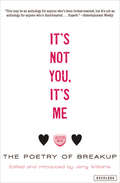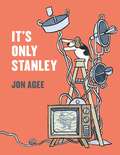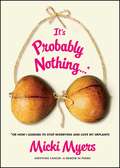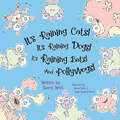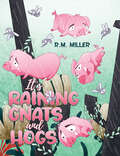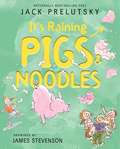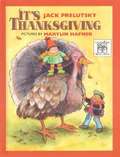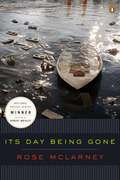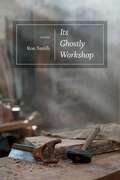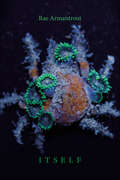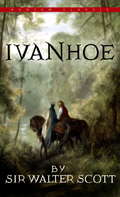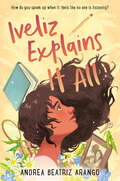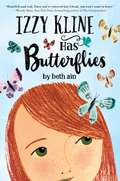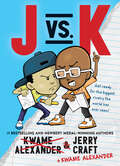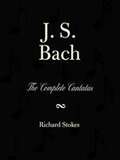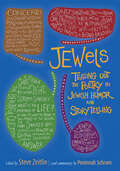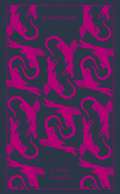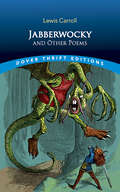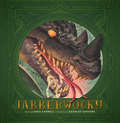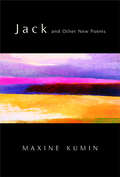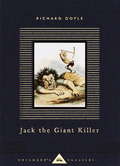- Table View
- List View
It's Not You, It's Me: The Poetry of Breakup
by Jerry Williams&“This may be an anthology for anyone who&’s been broken-hearted, but it&’s not an anthology for anyone who&’s faint-hearted . . . Superb&” (Entertainment Weekly). It&’s Not You, It&’s Me is a poetry anthology—at once amusing, angry, sweet, and bitter—that gives a fresh voice to the all-too-familiar experience of ending a relationship. Williams has compiled over ninety poems by contemporary writers including Denis Johnson and Kim Addonizio, as well as former poets laureate Robert Hass, Maxine Kumin, and Mark Strand, whose comforting and healing words dragged him out of his breakup-induced depression. We have all been through a breakup, but these poems have created an art out of heartbreak: sharing their wisdom on the pain of the flip side of romance, and poking fun at the mess we become at the mercy of love. &“This collection . . . gathers many of the poems that have helped Williams (a poet himself, with two books to his name) through his rooms of anguish over the years. Happily, they&’re pretty great.&” —The New York Times &“In It&’s Not You, It&’s Me: The Poetry of Breakup today&’s big contemporary poets make breaking up and even divorce sound painfully beautiful. You&’ll want to read with a box of tissues, a pint of chocolate ice cream and sappy love songs playing in the background.&” —Lemon Drop Literary
It's Only Stanley (Into Reading, Read Aloud Module #2)
by Jon AgeeNIMAC-sourced textbook <P><P>Fans of Jon Klassen and Oliver Jeffers will love this mischievously funny read-aloud from award-winning author/illustrator Jon Agee <P><P>Mysterious noises keep waking up the Wimbledon family. "That's very odd," says Mr. Wimbledon each time, but when he returns from checking on the sounds, he's always reassuring: "It's only Stanley; he's fixing the oil tank." "It's only Stanley; he's clearing the bathtub drain." <P><P>But what Stanley the dog is actually doing while his oblivious family goes back to bed is deliciously absurd: he's turning the house into a rocket ship to zoom himself and his family to another planet for an alien encounter. This is a perfect rhyming read-aloud for fans of irreverent tales like Click Clack Moo and I Want My Hat Back.
It's Probably Nothing...*
by Micki MyersDaring, sly, and unlike any other book you've read, this memoir-in-poems tackles cancer with a bawdy wit guaranteed to make you laugh your wig off.As a vibrant woman in her early forties, mother of two, poet, artist, and teacher, Micki Myers decided to confront her cancer diagnosis head on with the sharpest tools in her arsenal: namely, her sense of humor and unbridled poetic license. The result is a charming, poignant, laugh-out-loud collection that hits all the highs (morphine) and lows (everything else) of being a cancer patient and surviving with your spirit intact (even if your boobs are not). It's Probably Nothing... is the perfect gift for a friend in crisis, providing laughter, wisdom, and much-needed perspective. From losing your hair (even, ahem, down there) and gaining two bouncy silicone strangers, to the pitfalls of marijuana therapy and the endless chemo-room muzak "that makes you think/survival might be overrrated," Myers reminds you that you're not alone and that it's okay to laugh.
It's Raining Cats! It's Raining Dogs! It's Raining Bats! And Pollywogs!
by Sherry WestOne very unusual day, it rains, but not the kind that&’s expected . . .&“The heavens opened and down they sent one quite noisy elephant!&”And so, begins a very hilarious downpour of confused, amused, bemused, grumpy, frumpy, mumpy, lumpy, highly annoyed, and patiently suffering zoo full of animals onto an unseen town down below!&“We have to duck and run for cover while chickens cluck and near us hover! They&’re raining fast all over town! I wonder what else is coming down???&”Parents and educators alike enjoy reading this hilarious, highly-engaging and appealing book with its lyrical text and giggly-wiggly pictures to children, who quickly and easily acquire important language and reading skills along their merry way.
It's Raining Gnats and Hogs
by R. M. MillerThe weather report is simple and short: It&’s raining cats and dogs… then gnats and hogs… even hardhats and corndogs!And now there is no weather report – at least not the usual kind with maps and numbers and pastel colors and wiggling arrows.Instead of telling us how much rain and how long it last, the forecast is a rhyming blast for us to enjoy the rain!
It's Raining Pigs and Noodles
by Jack PrelutskyFollowing A Pizza the Size of the Sun, the reigning czars of silliness are back on the warpath, wreaking poetic havoc with yet another deliciously sly volume. The titles alone are a treat: "Never Poke Your Uncle With a Fork"; "I'm Ironing My Rhinoceros"; "Waffles Give Me Sniffles." Prelutsky trips the light verse fantastic across territory that's familiar yet fresh. He gleefully descends to the depths of gross-out humor ("Worm puree, oh hooray!/ You're the dish that makes my day"), engages in nimble wordplay ("There's no present like the time," he notes in "I Gave My Friend a Cuckoo Clock") and once again proves himself king of the final one-two punch (a knight confesses to ineffectuality in an ode closing with this couplet: "My name is famed through all the land/ I'm called Sir Lunchalot"). The sassy selection of nonsense rhymes and puckish poems will further endear Prelutsky to his many fans.
It's Thanksgiving
by Jack PrelutskyTwelve Thanksgiving poems, many of them funny, including: "When Daddy Carves the Turkey," "I Ate Too Much," "Daddy's Football Game," and "If Turkeys Thought." They're about families watching the Thanksgiving parade, fixing and sampling the food, breaking the wishbone for luck and too much left over turkey. Pictures are described.
Itihas Ke Aanshu
by Ramdhari Singh DinkarDinkar describes the Himalaya and Delhi in this book of poems. The most prominent is Magadh Mahima.
Its Day Being Gone
by Rose MclarneySelected as a winner of the National Poetry Series by Robert Wrigley Rose McLarney has won acclaim for image-rich poems that explore her native southern Appalachia and those who love and live and lose on it. Her second collection broadens these investigations in poems that examine the shape-shifting quality of memory, as seen in folktales that have traveled across oceans and through centuries, and in how we form recollections of our own lives. An opening sequence presents contemporary ghost stories: men who gather at dawn in the gas station parking lots of small towns; the mountain lion that paces the edge of a receding tree line. A middle section draws connections between Appalachia and Latin America, places that share qualities of biological and cultural richness--places that are threatened by modernization. A final sequence retells the stories of earlier poems, posing questions about how we construct our landscapes and frame our views.
Its Ghostly Workshop: Poems (Southern Messenger Poets)
by Ron SmithFrom the Mediterranean to the American West, the poems in Ron Smith's new collection move across time and place to find reliable truths through personal observation. Beyond his own experiences Smith draws from the lives of notable and diverse figures -- Edward Teller, Edgar Allan Poe, Mickey Mantle, Ezra Pound, Robert Penn Warren, Jesse Owens, Leni Riefenstahl, and many others. Its Ghostly Workshop probes the fallibility of philosophy while strengthening the quest for certainty. Wondering and weighing, these are poems capable of conviction as well as doubt. Like the city of Rome, the subject at the book's center, Its Ghostly Workshop aims to rewire us, to "virus" us, to "rush" us "with visionary blazes, cascades / of memory, incandescent logic."
Itself (Wesleyan Poetry Series)
by Rae ArmantroutWhat do "self" and "it" have in common? In Rae Armantrout's new poems, there is no inert substance. Self and it (word and particle) are ritual and rigmarole, song-and-dance and long distance call into whatever dark matter might exist. How could a self not be selfish? Armantrout accesses the strangeness of everyday occurrence with wit, sensuality, and an eye alert to underlying trauma, as in the poem "Price Points" where a man conducts an imaginary orchestra but "gets no points for originality." In their investigations of the cosmically mundane, Armantrout's poems use an extraordinary microscopic lens—even when she's glancing backwards from the outer reaches of space. An online reader's companion is available at http://raearmantrout.site.wesleyan.edu.
Ivanhoe
by Sir Walter ScottThus communed these; while to their lowly dome, The full-fed swine return'd with evening home; Compell'd, reluctant, to the several sties, With din obstreperous, and ungrateful cries. Pope's Odyssey.
Iveliz Explains It All: (Newbery Honor Award Winner)
by Andrea Beatriz ArangoHow do you speak up when it feels like no one is listening? In this moving novel in verse that Printz Honor-winning author Lisa Fipps calls "powerful," one girl takes on seventh grade while facing mental health challenges, and must find her voice to advocate for the help and understanding she deserves.Listen up:The end of elementary school?Worst time of my life.And the start of middle school?I just wasn&’t quite right.But this year?YO VOY A MI.Seventh grade is going to be Iveliz&’s year. She&’s going to make a new friend, help her abuela Mimi get settled after moving from Puerto Rico, and she is not going to get into any more trouble at school. . . .Except is that what happens? Of course not. Because no matter how hard Iveliz tries, sometimes people say things that just make her so mad. And worse, Mimi keeps saying Iveliz&’s medicine is unnecessary—even though it helps Iveliz feel less sad. But how do you explain your feelings to others when you&’re not even sure what&’s going on yourself?Powerful and compassionate, Andrea Beatriz Arango&’s debut navigates mental health, finding your voice, and discovering that those who really love you will stay by your side.
Izinkwazi ZoThukela IsiZulu Poetry Anthology: UBC contracted
by Londi P. M. MakhanyaLeli yiqoqo lezinkondlo eziqokelwe ukufundwa ebangeni le-12. Ingxenye yokuqala inezinkondlo eziqokelwe isiZulu uLimi lwaseKhaya. Ingxenye yesibili inezinkondlo eziqokelwe isiZulu uLimi lokuQala olweNgeziwe.
Izinkwazi ZoThukela IsiZulu Poetry Anthology: UBC uncontracted
by Londi P. M. MakhanyaLeli yiqoqo lezinkondlo eziqokelwe ukufundwa ebangeni le-12. Ingxenye yokuqala inezinkondlo eziqokelwe isiZulu uLimi lwaseKhaya. Ingxenye yesibili inezinkondlo eziqokelwe isiZulu uLimi lokuQala olweNgeziwe.
Izzy Kline Has Butterflies
by Beth AinSo many moments—big and small—make up a year, and Beth Ain chronicles them all in this heartwarming novel in verse, perfect for fans of Fish in a Tree and verse novels like Brown Girl Dreaming and The Crossover. Fourth grade is here, and Izzy Kline is nervous! There are plenty of reasons for the butterflies in her stomach to flap their wings. There’s a new girl in her class who might be a new best friend. The whole grade is performing Free to Be . . . You and Me—and Izzy really wants a starring role. And new changes at home are making Izzy feel like her family is falling apart. First-day jitters, new friends, an audition . . . How many butterfly problems can one fourth grader take?
J vs. K
by Kwame Alexander Jerry CraftCreated by real-life rivals and #1 New York Times bestselling authors Kwame Alexander and Jerry Craft this hilarious illustrated story features two talented fifth graders going head-to-head in a competition for the ages. J and K are the most creative fifth graders at Dean Ashley Public School (DAPS). J loves to draw and his wordless stories are J-ENIUS! K loves to write and his stories are K-LASSIC!! Both J and K are determined to win the DAPS annual creative storytelling contest or at least get in the top five. And when they find out that they are both entering The Contest, it's the beginning of one of the most intense rivalries the world has ever seen. It&’s artist vs. writer with plenty of shady double crosses as J and K plot their way to the top. This epic match-up from Newbery medal winners Kwame Alexander (The Crossover) and Jerry Craft (New Kid) celebrates comics, creativity, and the magic of collaboration.
J. S. Bach: The Complete Cantatas
by Richard Stokes Martin NearyIn Lutheran Germany in the 17th and 18th centuries, Sunday church services were five hours long. There would be prayers, liturgy, communion, an hour-long sermon, congregational hymn singing and a 15- to 25-minute "cantata" composed of chorus, vocal solos, and a hymn. These are sometimes referred to as "sermons in music." For a period of five years from 1723 to 1728 Johann Sebastian Bach wrote one of these cantatas almost every week. Sadly, almost 100 of these are lost. Bach's roughly 210 surviving cantatas are a major component of the western musical canon. This book contains their texts and English translations along with those for the Christmas and Easter oratorios. These surviving cantatas contain approximately 245 soprano arias, 223 alto arias, 249 tenor arias, 259 bass arias, many duets, a few trios and a couple of quartets. And all of them are inspired and inspiring. For this Bookshare edition, DAISY markup is provided so that each cantata title is at level 1 and each cantata movement is at level 2. To search for a particular cantata, type BWV, a space, its number, and another space. Each movement is presented fully in its original language (usually German) and then in English translation. To search for a particular movement (Sheep May Safely Graze, for example) which is the ninth movement of Cantata 208, type 208.9. Or to find the text of Jesu, Joy of Man's Desiring which is the sixth movement of Cantata 147, type 147.6. To quote Bach about music, its only purpose "is the praise of God and the recreation of the soul." Using a music service to which you subscribe or YouTube, ask it to play Bach Cantata 1 or Bach Cantata 51 or Bach Cantata 140 and see if you feel these works of music accomplish their composer's objective for you. For a sense of Bach's humor, ask your music service or YouTube to play Bach Cantata 211 (the Coffee Cantata) or Bach Cantata 212 (the Peasant Cantata). For instrumentation of all the cantatas and their individual movements, see the web site bach-cantatas.com because instrumentation is not included in this book. That site also provides commentary and translations into several other languages as these works continue to have worldwide interest.
JEWels: Teasing Out the Poetry in Jewish Humor and Storytelling
by Peninnah SchramJEWels is the first of its kind: the living tradition of Jewish stories and jokes transformed into poems, recording and reflecting Jewish experience from ancient times through the present day. In this novel hybrid—jokes and stories boiled down to their essence in short poems—Jewish witticism is preserved side by side with evocative storytelling and deepened with running commentary and questions for discussion. Illuminated here are jewels from journeys, from the Old Country, from Torah, shaped by the Holocaust, in glimpses of Jewish American lives, in Jewish foods, in conversations with God, and on the meaning of life. Jewish comedians (Lenny Bruce, Jackie Mason) appear alongside writers and musicians (Elie Wiesel, Sholem Aleichem, Itzhak Perlman) and Hasidic rabbis (the Baal Shem Tov, Rabbi Nachman of Breslov), yet most of the tellers are ordinary Jews. In this cacophony of ongoing dialogue, storytellers, rabbis, poets, and scholars chime in with interpretations, quips, and related stories and life experiences. In JEWels each of us can see our own reflection.
Jabberwocky and Other Nonsense: Collected Poems
by Lewis CarrollThe first collected and annotated edition of Carroll's brilliant, witty poems, edited by Gillian Beer. 'Twas brillig, and the slithy toves / Did gyre and gimble in the wabe...' wrote Lewis Carroll in his wonderfully playful poem of nonsense verse, 'Jabberwocky'. This new edition collects together the marvellous range of Carroll's poetry, including nonsense verse, parodies, burlesques, and more. Alongside the title piece are such enduringly wonderful pieces as 'The Walrus and the Carpenter', 'The Mock Turtle's Song', 'Father William' and many more.This edition also includes notes, a chronology and an introduction by Gillian Beer that discusses Carroll's love of puzzles and wordplay and the relationship of his poetry with the Alice books'Opening at random Gillian Beer's new edition of Lewis Carroll's poems, Jabberwocky and Other Nonsense, guarantees a pleasurable experience - not all of it nonsensical' - Times Literary Supplement Lewis Carroll was the pen-name of the Reverend Charles Lutwidge Dodgson. Born in 1832, he was educated at Rugby School and Christ Church, Oxford, where he was appointed lecturer in mathematics in 1855, and where he spent the rest of his life. In 1861 he took deacon's orders, but shyness and a stammer prevented him from seeking the priesthood. His most famous works, Alice's Adventures in Wonderland (1865) and Through the Looking-Glass (1872), were originally written for Alice Liddell, the daughter of the Dean of his college. Charles Dodgson died of bronchitis in 1898.Gillian Beer is King Edward VII Professor Emeritus of English at the University of Cambridge and past President of Clare Hall College. She is a Fellow of the British Academy and of the Royal Society of Literature. Among her works are Darwin's Plots (1983; third edition, 2009), George Eliot (1986), Arguing with the Past: Essays in Narrative from Woolf to Sidney (1989), Open Fields: Science in Cultural Encounter (1996) and Virginia Woolf: The Common Ground (1996).
Jabberwocky and Other Poems (Dover Thrift Editions)
by Lewis CarrollCarefully chosen collection contains 34 of Carroll's most appealing verses -- nonsense verse, parodies, burlesques, more -- including such unforgettable pieces as "The Walrus and the Carpenter," "The Mock Turtle's Song," and "Father William," as well as such lesser-known gems as "My Fancy," "A Sea Dirge," "Brother and Sister," "Hiawatha's Photographing," "The Mad Gardener's Song," "What Tottles Meant," "Poeta Fit, non Nascitur," "The Little Man That Had a Little Gun," and many others.
Jabberwocky: A Nonsense Coloring Book (Visions In Poetry Ser. #1)
by Lewis CarrollGet lost in this magical world full of beasts -- both familiar and fantastical -- with your children while reading and re-reading Jabberwocky year after year.'Twas brillig, and the slithy toves did gyre and gimble in the wabe; All mimsy were the borogoves, and the mom raths outgrabe.Lewis Carroll's most iconic seemingly nonsensical poem is brought to life like never before with award-winning illustrator Charles Santore's stunning renditions of a brave warrior who is on a mission to slay the dastardly Jabberwock. Get lost in this magical world full of beasts (both familiar and fantastical) with your children while reading and re-reading Jabberwocky year after year.
Jack and Other New Poems
by Maxine Kumin"Measured but warm, this work draws you in; it is another success among her many titles."--Library Journal In her fifteenth collection, Maxine Kumin meditates on the social consequences of such events as the bicentennial of the Civil War, and looks to poets writing from circumstances vastly different from her own. With death the central theme, poems of the body and praise songs for beloved animals explore how memory consoles and haunts.
Jack and The Beanstalk, with Benjy and Bubbles
by Ruth Lerner Perle Susan HorowitzA delightful retelling of the children's story Jack and the Beanstalk in rhyme. Includes picture desriptions.
Jack the Giant Killer
by Richard DoyleThe story of Jack, the intrepid boy whose courage and ingenuity defeated a host of many-headed giants, has been told to children for hundreds of years. In 1842, when he was just 18, Richard Doyle, whose natural talent for draftsmanship was matched by imaginative invention and a passion for legend and the grotesque, created a picture-book version of Jack the Giant Killer, with hand-written text and a watercolor within a pictorial border decorating every page. It has remained one of the most beloved versions of this timeless tale.In this new Everyman's edition, Doyle's vivid, wonderfully engaging illustrations have been enlarged and the text has been given greater legibility. It is a book that will satisfy both the child's delight in scariness, wonder, and magic, and the collector's pleasure in classic Victorian illustration.
